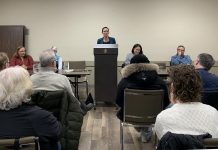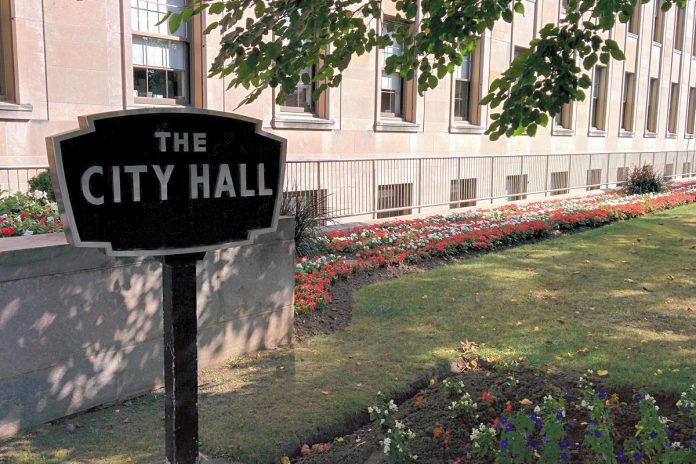Peterborough city council will be reconvening for its first meeting since July 2 after the Civic Holiday long weekend.
Councillors will meet as general committee at 6 p.m. on Tuesday (August 5).
The general committee meeting will follow a closed session at 4 p.m. on unspecified land-related and legal items and a public meeting on development charges at 4:45 p.m.
Public Meeting – Development Charges
City staff and a consultant will present council with an amended background study on city-wide development charges for municipal services, and public delegations will be heard. The study proposes an amended rate for development charges, which were approved by council in December and came into effect on January 1.
The proposed amended rate, which reflects lower capital costs for sewage services and for road-related capital projects because of grants received by the city, is $68,604 rather $70,953 for the residential rate (a decrease of 3.3 per cent) and $257.29 rather than $268.61 for the non-residential rate (a decrease of 4.2 per cent). The amended rate would take effect September 2.
Council will not be required to make any final decisions during the public meeting. City staff will present a staff report with the final recommendations and proposed by-law at the August 25 general committee meeting, with final approval at the September 2 city council meeting.
Following the public meeting, council will reconvene as general committee at 6 p.m. to consider 12 committee reports.
March 31, 2025 Financial Report (Unaudited)
A March 31 unaudited financial report on the city’s operating budget and capital works in progress includes a recommendation that the $4,075,316 budget for airport water and sewer upgrades be reduced by $866,700, representing an allocation to the city from the Canada Community Building Fund.
The report also recommends the uncommitted budget for the Incentives for Affordable Housing capital budget be transferred into three new capital projects (one for incentives paid to developers, one for tax rebates paid to developers, and one for lost assessment tax revenue resulting from providing tax exemptions to developers).
Zoning By-law Amendment for 1341 Water Street
Council will consider an update of the proposed application to amend the zoning by-law for 1341 Water Street to permit an eight-storey apartment building that was previously considered by council on June 30.
Originally, the developer wanted the flexibility to develop either a student-focused apartment building with up to 219 dwelling units and a reduced parking requirement of 117 parking spaces or a traditional market rental building subject to more traditional zoning regulations.
Council deferred a decision, asking that the developer confirm the intended use of the property. The developer presented a revised concept to council on June 30 for an eight-storey apartment building with 159 units with 175 parking spaces. City staff are supporting the revised concept.
Physician Recruitment
A report on the city’s physician recruitment program recommends that the current pilot project become a permanent program beginning in 2026-27, continuing a multi-pronged physician recruitment and retention strategy including financial incentives, refinement of the “Whole of Village” incentive program, and enhanced participation in international recruitment efforts.
The report highlights that 13,363 additional patients would become unattached if all physicians over the age of 65 retire in Peterborough without replacements.
According to the report, as of May 2025, the current pilot project has seen six new Family Health Organization physicians begin practising in the community, keeping approximately
8,000 patients from becoming unattached, one independent practice physician from the United Kingdom who has rostered over 2,200 patients, and three Community Health Centre physicians who are looking after vulnerable sector patients.
The report is recommending that the city’s current contract physician recruitment coordinator position be converted to a permanent position. The cost of converting the pilot physician recruitment program (fully funded for 2025) to a permanent program would be included in the city’s draft 2026 budget.
Pedestrian Crossing Program on Collector Roads
A report on the city’s Pedestrian Crossing Program on Collector Roads recommends that five pedestrian crossings be implemented in 2025 at McKeller Street at the Crawford Rail Trail, Erskine Avenue at the Crawford Rail Trail, Glenforest Boulevard at Ravenwood Drive, Park Street North at Hunter Street West, and Walker Avenue at Walker Park.
The cost of implementing the pedestrian crossings is estimated at $230,000.
The report also recommends that an intersection pedestrian signal be implemented in 2026 at the intersection at Wolsely Street and Donegal Street, subject to the availability of capital funding.
Traffic Calming Phase 2 Permanent Installations
A report recommends the installation of permanent traffic calming measures in the Sherburne Street, Highland Road, and High Street neighbourhoods.
In fall 2023, temporary traffic measures were installed in the Highland Road neighbourhood (rubber speed cushions and a speed limit reduction to 40 km/h) and the High Street neighbourhood (a change to one-way southbound traffic, a protected pedestrian pathway, and a pedestrian crossover), along with a modification to the existing temporary traffic calming measures implemented in the Sherburne Street neighbourhood (rubber speed cushions).
As there is insufficient funding in the capital budget to make the measures permanent, staff are recommending that $236,250 be allocated in the 2026 capital budget request for to install permanent traffic calming measures in the Sherburne Street and Highland Road neighbourhoods.
As permanent traffic calming measures for High Street would include the construction of a sidewalk and the reconstruction of High Street between Sherbrooke Street and Chamberlain Street at an estimated cost of $7.3 million, staff are recommending the cost be be added to the Engineering and Capital Works Division road reconstruction program with a request for funding in future capital budgets.
Designation of Listed Heritage Properties
Council will consider five reports related to designation of listed heritage properties.
The first report provides an update on the ranking of 43 properties listed on the city’s heritage register that were previously identified as priorities for designation. The original list contained 56 properties, but was reduced to 43 through removal of properties directed by city council or by recent consideration of designation.
The remaining four reports recommend the designation of 216 Simcoe Street (Stevenson Hall), 183 Hunter Street West (The Bell Telephone Exchange), 441 Rubidge Street (St. Andrew’s Church), and 1290 Hilliard Street (The Stothart Farmhouse).
Request for Additional Funds for Future Monitoring of Jackson Creek
A report updating council on emergency measures taken to remediate oil discharge in Jackson Creek recommends that $498,624 be allocated for future monitoring and remediation of the issue.
In August 2022, an oily sheen on Little Lake was reported, which was determined to be historical contamination predominantly from the city bus garage on the north side of Townsend Street. Work has been completed with Cambium Inc. to contain and clean up contamination released to the culvert, control the contamination, and prevent further releases.
Additional contamination in Jackson Creek at Little Lake in spring 2025 was found to be unrelated to the earlier issue; it was caused by a mineral spill at Hydro One’s Aylmer distribution station as a result of damage caused by metal theft.
The request for $498,624 in funding includes an increase to $290,000 plus $37,000 HST for Cambium Inc. to provide ongoing groundwater and surface water monitoring and reporting until 2029, as well as a budget of $200,000 plus $26,000 HST to identify and implement a continuous oil sheen detection system at the confluence of Jackson Creek and the Jackson Creek bypass sewer for real-time monitoring and alarming of petroleum products that may enter the water course.
Renewing Community Safety and Well-being Plan
Council will consider a report providing an update of the city’s Community Safety and Well-being Plan, adopted in 2022 and due for renewal in July 2026 as required by provincial legislation.
Staff of the city and county of Peterborough are recommending moving forward with a joint plan, with discussions underway to involve all eight townships in the county, including three townships that have a separate plan.
City staff are recommending a “a focused and modest approach to undertake the plan renewal without devoting unnecessary resources to the process” as the priorities in the existing plan are still current and there are no additional financial resources available to implement the plan beyond what is already being done in the community.
Capital Loan Funding Request for Thrive Housing and Support
A staff report recommends that council approve an unsecured capital loan of up to $1 million for Thrive Housing and Support, Peterborough’s second-largest social housing provider after the Peterborough Housing Corporation.
The loan would be used to repair critical infrastructure at the Towerhill Village site, which includes 66 rent-geared-to-income units and five market units. Repairing aging sewer lines and failing retaining walls at the site will cost an estimated $1.82 million.
The city has already contributed $525,000 through its 2024-25 funding under the Canada-Ontario Community Housing Initiative (COCHI) and Thrive will contribute an additional $294,222.50 from its capital reserves. The shortfall would be funded through the unsecured capital loan.
Repayment of the loan would begin in 2028 following the end of the non-profit community housing provider’s mortgage on the property.
2026 Community Wellbeing Fund
City staff are recommending the council approve a framework for a Community Wellbeing Fund to be established for 2026, consolidating the previous city funding streams for community project grants, community investment grants (to be renamed community development grants), and community service grants.
For arts organizations, the report recommends that a separate arts investment fund be established in 2025, which would include all city funding for the arts including individual artists grants, funding for Artsweek and the city’s poet laureate program, and a new two-year pilot of a professional arts organization grant with $60,000 in funding.
The report recommends that the professional arts organization grant be postponed until 2027 to align with the development of the city’s new municipal cultural plan.
The report states that the community development grants are not intended to be core funding, although “it is recognized that they may have been used this way in the past,” and must be used during the fiscal year — meaning that multi-year grants will no longer be supported.
The report also states that new projects and initiatives will be a funding priority for community development grants “to reduce the reliance of community grants as long-term core funding.”
The city’s citizen-led arts and culture advisory committee (ACAC) reviewed the city’s proposed Community Wellbeing Fund at its May and June meetings and, at both meetings, unanimously voted against endorsing the report. ACAC’s two letters of objection to the Community Wellbeing Fund will also be received by council.
A summary of some of ACAC’s key objections to the Community Wellbeing Fund are provided below.
- The program design is not appropriate for arts organizations and will not help to advance their work and impact.
- The delay of the professional arts organization grant until 2027 means that, until then, arts organizations will be competing with non-arts organizations when applying for city grants — which was one of the reasons a separate grant for arts organizations was proposed in the first place.
- The $60,000 in funding for the professional arts organization grant is far lower than the total value of grants awarded to arts organizations in previous years (including $103,728 in 2023, $115,128 in 2024, and $96,550 in 2025), and there is no clear rationale for the selection of this amount of funding.
- Any new funding programs that potentially affect arts and culture organizations should only be introduced after the new municipal cultural plan has been approved by city council.
- The elimination of multi-year funding commitments in community development grants is counter productive, as it will increase the workload of arts and culture organizations as they will have to re-apply every year.
- The elimination of operating support in community development grants and giving priority to new projects and initiatives is problematic, as stable operating funding provides not-for-profit organizations with the ability to plan for the long term, sustain employment, and generate other revenue (including grants from other levels of government).
Items endorsed by general committee on August 5 will be considered by council for final approval the following Monday.
Council meetings are streamed live at www.peterborough.ca.



























